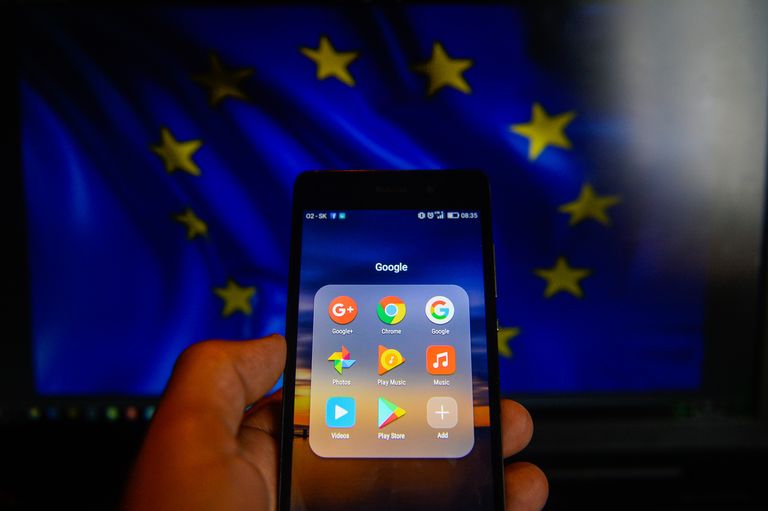What's Behind Google's Enormous $5 Billion Fine from the EU
It's all about your default browser.
By Eric Limer
Google app are seen in a mobile with android operative...GETTY IMAGESSOPA IMAGES
Wednesday the European Commission levied a record breaking $5 billion (€4.34 billion) fine against Google for breaking antitrust regulations. The fine blames Google for compelling phone manufacturers who use the Android operating system—which is free for use with no fee—to bundle in Google's suite of apps like Google Chrome if they want to include the Google Play store, giving users access to Android's largest official store.
Google plans to appeal the fine, naturally, but the showdown could drastically affect the shape of the mobile web. Here are the basics of what's going on and what it could mean.
How Android gets on your phone
Unlike Apple which makes its own hardware and its own software and sells the two bundled together as the iPhone, Google makes the Android software and provides it essentially for free to unrelated hardware companies who need software for their phone to run.
The underlying framework of Android is open source and completely free, which means anyone can use it without so much as a nod in Google's direction. The catch, however, is that this version of Android does not include access to the Google Play Store, which Google controls more closely. If you want a license to include the Play Store, Google simply requires you to include some of its other apps, like Chrome.
The Play Store is not the only app store available on Android, so it's not mandatory. The FireOS operating system that runs on Amazon's Fire tablets is a modified version of the open-source bones of Android that relies on Amazon's own app store, for instance. But for most phone makers who don't have an alternative, app inclusion can be a small price to pay.
What's more, according to the European Commission's report, Google makes it difficult to not pay that software price.
Just (anti)trust me
The European Commission has taken three main issues with Google's behavior, first and foremost relating to the bundling of the Google Search App and Google Chrome, which also guides users back to Google Search.
The Commission breaks out some numbers to illustrate what it seems as an unfair competitive advantage considering nearly every Android device sold in the EU comes with Google's apps:
[In] 2016:
- on Android devices (with Google Search and Chrome pre-installed) more than 95% of all search queries were made via Google Search; and
- on Windows Mobile devices (Google Search and Chrome are not pre-installed) less than 25% of all search queries were made via Google Search. More than 75% of search queries happened on Microsoft's Bing search engine, which is pre-installed on Windows Mobile devices.
Google's practice has therefore reduced the incentives of manufacturers to pre-install competing search and browser apps, as well as the incentives of users to download such apps. This reduced the ability of rivals to compete effectively with Google.
In other words, it's all or nothing.
Based on these three charges, the Commission dropped its $5 billion fee, calculated in part from the revenue generated by Google's search revenue in the EU.
Not so fast
In a response to the Commission's report, Google's CEO Sundar Pichai articulated a defense of Google's practices, arguing that Android is actually responsible for the diversity of available devices and that pre-installed apps are uninstallable and easy to remove. He also says Android isn't a monopoly because it's competing with Apple and iOS.
While Pichai's arguments are techinically true, they are also considerably misleading. Android does compete with Apple when it comes to selling smartphones to people like you and me. But Apple only puts iOS on its own devices, which means that Apple does not compete with Google in any of the arenas that this fine covers. Furthermore, Google has little to no meaningful competition in the search engine space.
PIchai also uses the post to suggest outcomes that aren't necessarily a consequence of the Commission's fine (emphasis mine):
The free distribution of the Android platform, and of Google’s suite of applications, is not only efficient for phone makers and operators—it’s of huge benefit for developers and consumers. If phone makers and mobile network operators couldn’t include our apps on their wide range of devices, it would upset the balance of the Android ecosystem.
Google intends to appeal the fine, according to Pichai, but in the meantime, the fine still applies. The money will be moved into a closed account and transferred to the EU if the appeal fails, or back to Google if it succeeds.
Of course this isn't the first time an American tech giant has been hit with antitrust regulation, specifically for browser pack-in behavior. In 1984, the United States Department of Justice went after Microsoft for using a similar stranglehold on the PC operating system market to crush competition in the software space. Microsoft eventually successfully appealed the court's original decision that Microsoft be split into two separate companies and escaped with a far smaller penalty.
Only time will tell if Google can manage a similar escape from a fine that, while huge, is not quite so dire as a breakup.
No comments:
Post a Comment